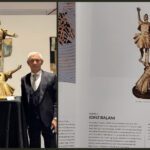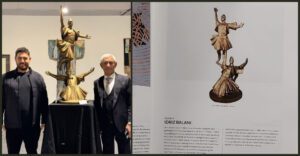In a compelling blend of science and philosophy, Albanian-American physicist Laura Mersini-Houghton sheds light on the enigmatic relationship between the cosmos and our beliefs. Her recent talk, “Is the Universe Theologically Ambiguous?”, delves into the intricate dance between faith and science, a topic that resonates deeply with the Albanian-American community.
Mersini-Houghton, a leading figure in cosmology, offers a fascinating perspective on how different beliefs interpret the universe. She points out, “The theist will say if there is a God, the universe is exactly what you’d expect it to look like,” while on the other hand, “the atheists would say if there is no God the universe is exactly the way we find it.” This observation highlights the subjective nature of our understanding of the universe.
For Albanian-Americans, often balancing traditional beliefs with contemporary scientific understanding, Mersini-Houghton’s insights provide a meaningful connection. She emphasizes the distinction between religion and personal belief in a higher power, stating, “Religion and believing in God are two very different things.” This distinction allows for a personal interpretation of faith and the universe, accommodating a range of beliefs within the community.
Mersini-Houghton also speaks to the heart of scientific inquiry, likening it to a journey without a final destination. “We are at the beginning of a journey,” she says, suggesting that the pursuit of scientific understanding, much like the immigrant experience, is an ongoing process of exploration and discovery.
Her talk is not just about reconciling different worldviews but embracing the unknown. She proposes that the true beauty of science and life lies in the continuous quest for knowledge. “I cannot imagine a more dreadful world than a world where all the questions are answered,” Mersini-Houghton reflects, advocating for a world that always keeps us curious and learning.
In summary, Laura Mersini-Houghton, as an Albanian-American physicist, offers a unique perspective that bridges the gap between the mysteries of the universe and the realm of faith. Her insights encourage the Albanian-American community to explore these complex questions, appreciating the beauty of both scientific discovery and personal belief. As we navigate our own paths, Mersini-Houghton’s words serve as a reminder of the richness that comes from embracing the unknown and the diverse perspectives that shape our understanding of the world.








